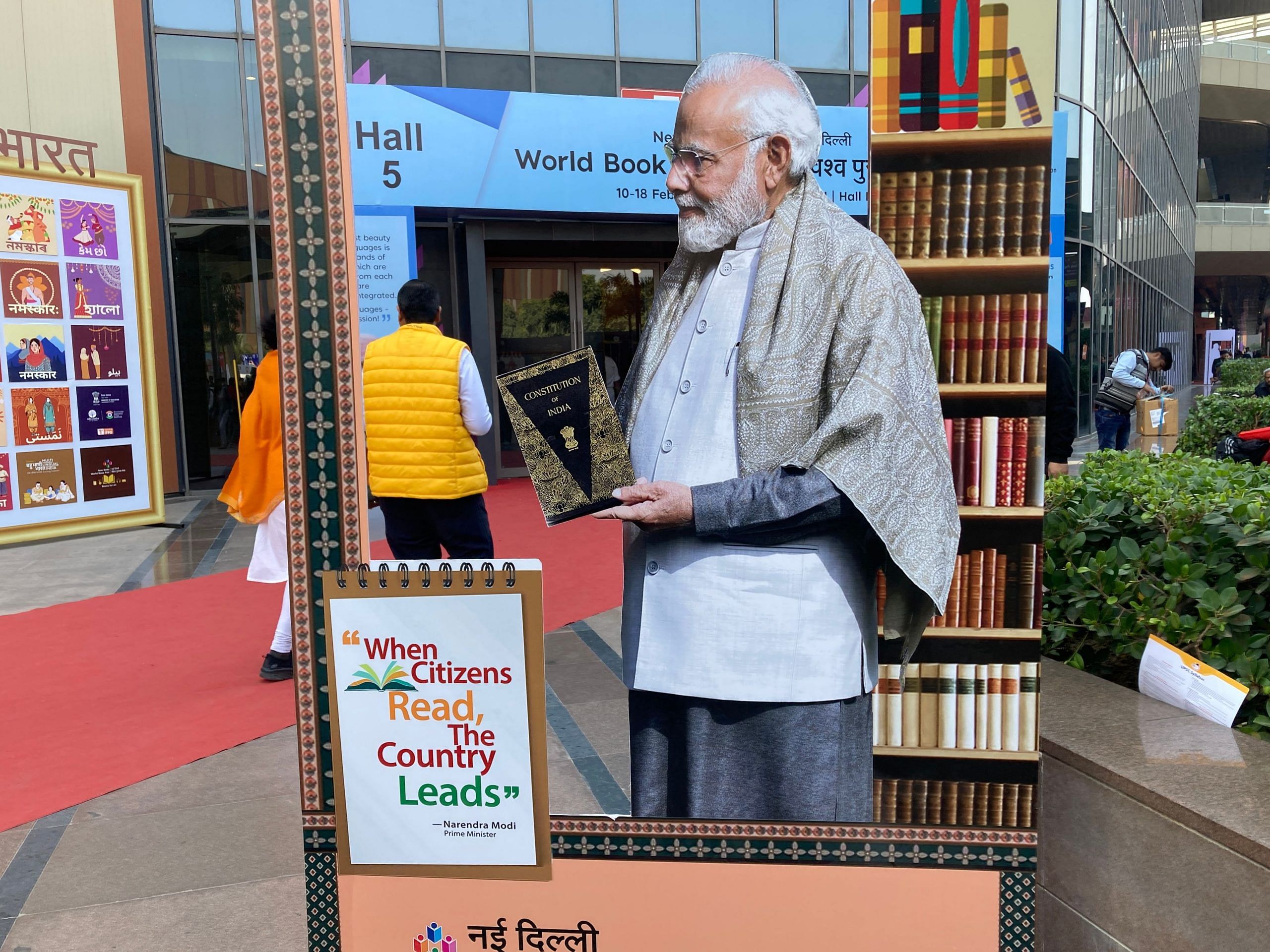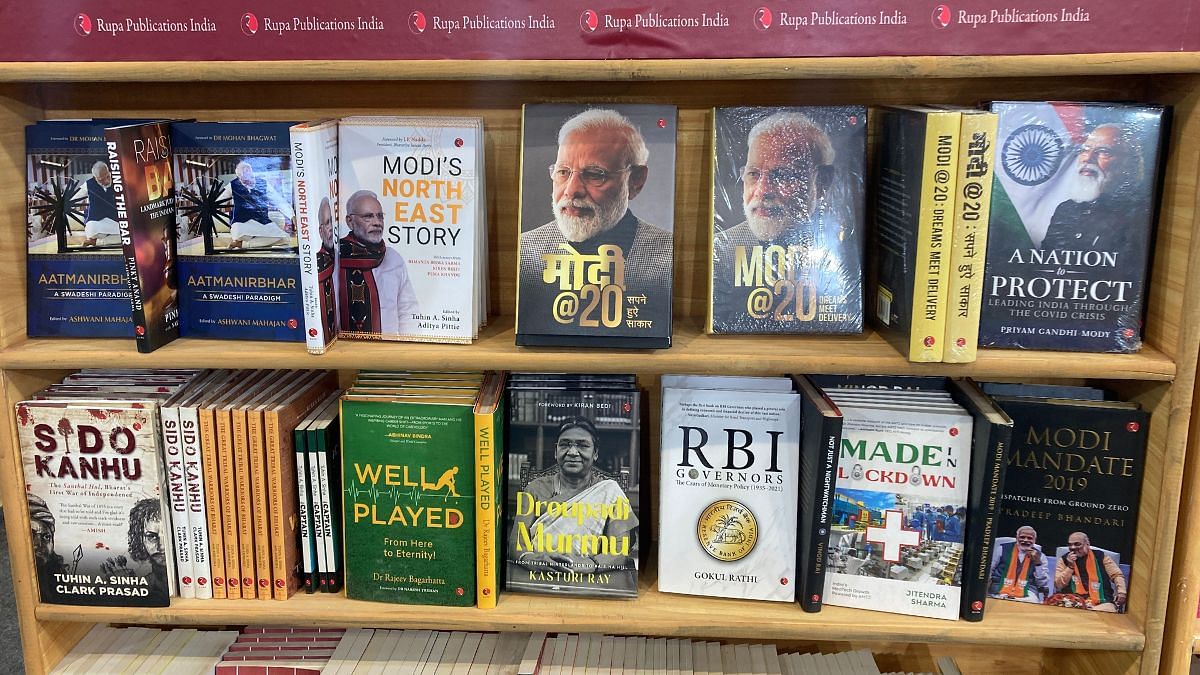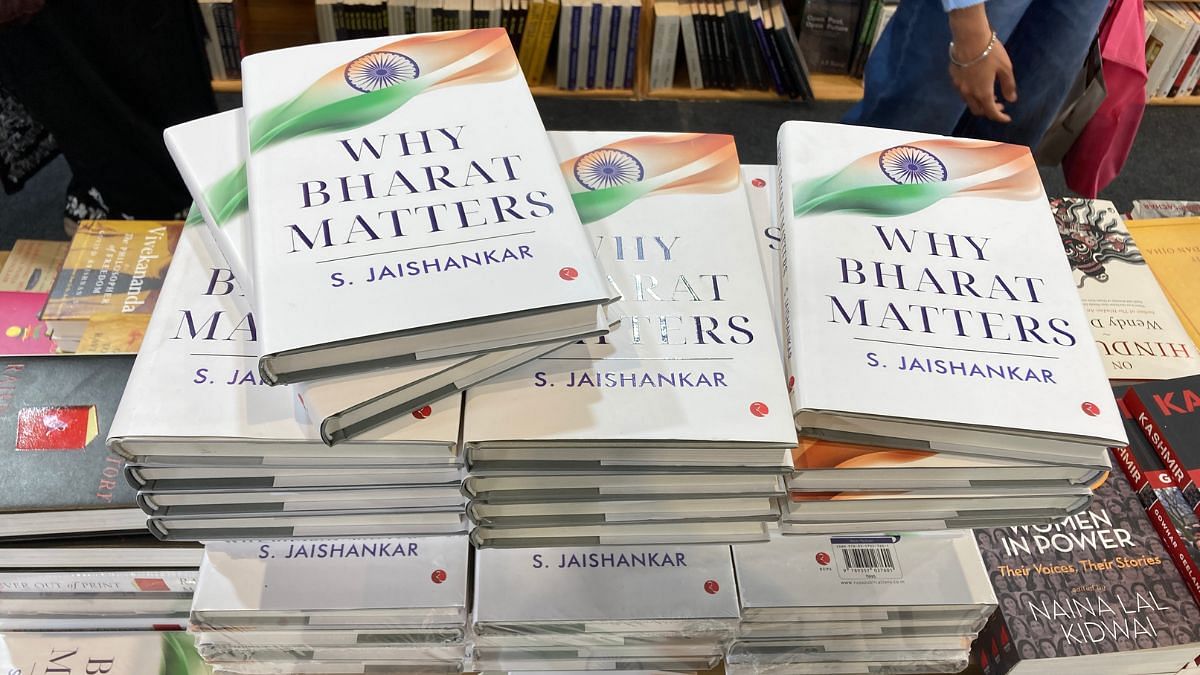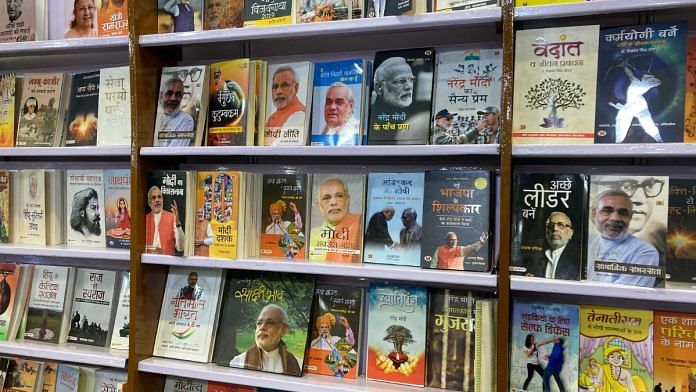New Delhi: A group of college students mill about the bestsellers section of a book stall at the New Delhi World Book Fair. Nearly all the books they are looking at are about Prime Minister Modi.
From his thoughts on social harmony and empowering women to his impact on the middle class and how he is ‘a true Sikh’ — the students at the book fair cannot stay impervious to Modi-isms. And if they tire of Modi’s thoughts, all they have to do is turn to the next stall and encounter external affairs minister S Jaishankar, or chemicals and fertiliser minister Mansukh Mandaviya and their new books on Modi’s foreign and fertiliser policy.
“When citizens read, the country leads,” proclaims Modi on several cutouts and hoardings peppered across the book fair.
India is changing. And Indians are reading more about this change — especially books on Modi, and Modi’s new India. This interest has spawned a new generation of books, and the market is flooded with books on every imaginable wrinkle of the Modi era. And they are not just written by journalists and scholars. A new breed of writers is emerging – CEOs, tech gurus, RSS believers and self-published experts.
Books on the Modi era are now a growing knowledge-production industry meant to mirror the political churn underway in India. The BJP has the numbers, what it now needs is narrative-setting and intellectual capture.
“In the last ten years, we’ve seen so much change in every aspect of India. Modi’s thoughts are behind this change, and we take inspiration from them,” says Prabhat Kumar, director of publishing house Prabhat Prakashan. It was their stall where the students were perusing the range of Modi’s thoughts on various subjects. “That’s why people are interested in his opinions, and why we publish books on them. That’s what people want to know.”
Publishers say they defer to the market — they simply supply the demand. And it’s a burgeoning market, projected to reach $12 billion by the end of 2024. In fact, India is touted as the world’s largest marketplace for books and publishing.
In the last ten years, we’ve seen so much change in every aspect of India. Modi’s thoughts are behind this change, and we take inspiration from them
– Prabhat Kumar, director, Prabhat Prakashan
Every politics section on publishers’ websites is full of titles capturing various aspects of Modi’s India. And it’s not just books on history or politics: biographies are all the rage, as well as books on foreign policy, development, and law. They are being commissioned and pitched, as a voracious market waits to devour anything and everything about a new, rebranded India under Modi’s leadership.

The Amazon bestsellers list is another indication: Jaishankar’s Why Bharat Matters is in the top 100 books sold in India and has consistently topped the political bestseller list since it came out in early 2024. Following closely on its heels are India That is Bharat: Coloniality, Civilisation, Constitution by J Sai Deepak and Hindus in Hindu Rashtra by Anand Ranganathan.
“Isn’t your library full of books on Modi and Modi’s era?” asks Nilanjan Mukhopadhyay, journalist and author of the 2013 biography Narendra Modi: The Man, The Times. “He remains the central figure in the Indian sociopolitical narrative. Just like Indira Gandhi was once — but at the time, the Indian publishing scene wasn’t very well developed, and there wasn’t as much nonfiction writing in English. Now, you can’t spend five minutes with newspapers, magazines, television, or social media bypassing Modi.”
Also read: Savarkar broke monopoly of Nehru-Gandhi history books. Now there’s new appetite, wishlist
Stake in public debate
It’s not surprising to see spicy political biographies — usually dripping with explosive intrigue and well-kept secrets — on bestseller lists. What’s unusual is a coveted spot on the bestseller list going to a book on India’s fertiliser policy, albeit written by Minister of Chemicals and Fertilisers Mansukh Mandaviya.
But this only shows how the market has grown in the last few years.
“During the last election in 2019, there was a wave of books pertaining to Modi, including several biographies and autobiographies,” says Sameer Mahale, associate vice president – online & north India (sales), Penguin Random House India. “This election cycle so far we haven’t seen as much on Modi the man, but there are lots of books on Modi’s India.” Penguin has recorded more sales of books on economics and public policy this election cycle.
It points to an important shift: Readers today are not only interested in Modi as a political figure, but also in his nation-building, and how India has been transforming. And every change is hotly discussed and debated on social media, WhatsApp groups and chai stalls. Indians have never had a stake in the dominant public debate before.

The fascination with Modi extends into a fascination with everything around him and his government’s decisions. There are books going over policy decisions, on demonetisation, Swachh Bharat, decentralised democracy, biographies of influential Indians, essays on India in transition. There are books excavating culture and the subcontinent’s civilisational past, including Hindutva, Islamic extremism, and India as a dharmic country. Books about the remaking, resurgence, and revival of India are a genre unto themselves. Constitutionality, lesser-known heroes, geopolitics, caste, revisionist narratives — no topic is left untouched. There are even scientific retellings of mythologies. It’s an inkspill that could line bookshelf after bookshelf.
They span across the ideological and political spectrum, from Saba Naqvi’s The Saffron Storm: From Vajpayee to Modi to Priyam Gandhi-Mody’s What If There Were No Congress: The Uncensored History of Independent India. Both January 2024 releases, these books are the interpreters of new India, and it began with the bestselling 2017 Prashant Jha book, How The BJP Wins: Inside India’s Greatest Election Machine, which popularised the words ‘Panna Pramukh’ for the average readers. Rahul Shivshankar’s 2023 book Modi & India: 2024 and the Battle for Bharat is one of the latest following in these footsteps.
This election cycle so far we haven’t seen as much on Modi the man, but there are lots of books on Modi’s India.
– Sameer Mahale, associate vice president – online & north India (sales), Penguin Random House India
“You can call it Modi’s branding, but in the last 10 years there’s been a real change in the approach to books, aided by social media and political figures appearing on more accessible platforms like podcasts,” says Manek Jaiswal, who runs a publishing company called Paper Towns Publishers. “People are now interested in being part of the political debate.”
One of the top sellers from his stall at the book fair is a new title called Modified India: Modibhakti Justified. It’s a manual by Rabinarayan Dash, an accountant by profession, on a wide range of Modi’s schemes and programmes, aiming to justify his hypothesis of ‘Modibhakti.’
“The real change is that people are now interested in gaining knowledge, and not just entertainment,” says Ankur Pathak, co-founder of Garuda Books. He said that Garuda has noticed an increased interest in people trying to understand their civilisational roots, as well as in how to improve themselves through self-help books. “And books set the discourse, the narrative. People from the past are still affecting the minds of people in this time.”
He adds that only informed citizens can make things better for the country. “That’s how democracy sustains.”
Also read: All political talk in India is obsessing over 2024. The real deal is 2025
Lots to write about
Publishing about the Modi era might not be a marked departure from publishing activity during previous political eras. But it underscores an age of appetite for politics.
“In a sense, it’s not really different from any previous time in India, because politics has always been at the centre of the conversation, and of publishing,” said VK Karthika, publisher, Westland Books. “But when you consider how much is being published now, about the current state of affairs and this new India, it looks like a whole genre in itself.”
Most publishers admit that their decisions are as much driven by the commercial market and profit-making as anything else.
And authors with big followings will inevitably find that their books do well.
It’s also why books by writers like J Sai Deepak and Vikram Sampath become instant bestsellers — they have huge fan followings and the medium reaches an entirely new audience. Similarly, books that are critical, like those by Aakar Patel or Christophe Jaffrelot also sell well. So do books by figures like Raghuram Rajan and Amitabh Kant — economists writing about Modi’s India. A cursory Google search is enough to see the glut of books that circle Modi.
It’s not really different from any previous time in India, because politics has always been at the centre of the conversation, and of publishing. But when you consider how much is being published now, about the current state of affairs and this new India, it looks like a whole genre in itself.
– said VK Karthika, publisher, Westland Books
But publishers also point to how the market shapes their output: there was a time when publishers tended to veer away from books on morality, but moral stories sell today. Nowadays, parents are buying books for their children that are more religion-centric— an Amazon bestseller is Shlokas and Mantras – Activity Book For Kids. There are also books on topics like making strategic decisions with the help of moral lessons from Hindu epics like the Mahabharata— like Aruna Narlikar, Amitabh Mattoo and Amrita Narlika’s Strategic Choices, Ethical Dilemmas: Stories From The Mahabharat. Fresh, revisionist historical narratives in books that highlight alternative histories, such as Vikram Sampath’s Bravehearts of Bharat: Vignettes from Indian History, also have a wide readership.
Modi has also redefined what’s commercially exciting.
Subjects like history and economic development — genres that are used to being written off in favour of more exciting themes – are becoming buzzy.

“He continues to be a figure about whom plenty can be written. Of course, there will be books and books because there’s so much interest in him as a personality,” says Mukhopadhyay, whose own biography of Modi stemmed from his interest in the rise of Hindu Right-wing forces in India.
Westland even explored publishing an updated version of the book. If there wasn’t sustained interest in Modi as a figure, why would a publishing house look to release another edition a decade later?
“I think there’s going to be a perennial interest in [this era],” said Karthika. “PM Modi is not just another public figure, or just one prime minister in a long line of them. He is changing India in fundamental ways.”
Also read: An IIT engineer is publishing books others won’t. Garuda wants to ‘decolonise Indian mind’
Taking a political stance
As new authors emerge in the mainstream publishing companies, there is also the emergence of a parallel Right-wing press who are more aligned with the BJP’s political and cultural agenda. Their goal is to break the notion that there is only one idea of India.
Publishing houses like Garuda Press specialise in foregrounding “Indic narratives” and publishing books about India’s civilisational glory. Their published titles include books India Before and After 2014: Why Bharath needs BJP in 2024 | Observations of a Millennial by Dr. B Vinusha Reddy, Modi Magic: The Nudge Theory, India, Pakistan, China and More by Ashali Varma, and Saurav Dutt’s Modi and Me: A Political, Cultural & Religious Reawakening. They have also published books like Urban Naxals by Vivek Agnihotri and the controversial 2020 Delhi Riots: The Untold Story, by Monika Arora.
“The feedback we get from readers is that they don’t want one narrative, they want a range of titles to choose from,” says Mahale from Penguin.
But smaller publishing houses that have taken an ideological stance can be less particular about the content they publish.
A publisher at a general trade publishing house told ThePrint that they wished they could belong to an ideologically aligned press— like a feminist or openly left-leaning one. It might make things easier for them, rather than just following the numbers.
And the numbers can be misleading: while marketing can create a lot of noise in echo chambers online, the book in question might not actually sell copies. The goal then is to fuel public conversations and airport visibility.
PM Modi is not just another public figure, or just one prime minister in a long line of them. He is changing India in fundamental ways.
– said VK Karthika, publisher, Westland Books
The world of nonfiction and political analyses has expanded beyond its English echo chamber to claim what was traditionally a left-leaning space.
“There’s always been an interest in political books, but this interest feels heightened in this era,” says Anish Chandy, literary agent and founder of Labyrinth Literary Agency. “You have books that both demonise and valorise the government. People on both sides find Prime Minister Modi very fascinating as a figure, as opposed to previous political figures.”
But Chandy says that while people are interested in understanding more about the country, it’s complicated to get to the hard truths of any subject.
A new Modi market
Modi’s influence on readers, writers, and the publishing industry at large is hard to miss at the Delhi Book Fair. Stall after stall carries copies of books about him in different languages, and people line up to take selfies with a cutout of Modi holding the Constitution.
And he’s the kind of figure to generate conversation from both ideological camps, often these books sit side-by-side on publisher’s lists. Aleph’s top books over the last few weeks include Jaishankar’s Why Bharat Matters and Love Jihad and Other Fictions: Simple Facts to Counter Viral Falsehoods, by journalists Sreenivasan Jain, Mariyam Alavi, and Supriya Sharma.
“Our Prime Minister is a lover of books himself!” says Kumar from Prabhat Prakashan. “And he keeps writing. It’s because of his encouragement and his own prolific output that people are drawn to reading.”
(Edited by Theres Sudeep)




Modi is a very strong and decisive leader. Like that of a king in monarchy or autocrat in autocracy. But it is to be noted that, the growth of a country is highest under monarchy if the monarch is good. Modi loves India and all his actions, decisions are for the good of India, nobody can question his devotion to India. In a proper democracy, Modi would not have been elected. But India and the world was in an exceptional situation when Modi arose. The world realized the dangers of terrorism after 7/11. Indians were too fedup with Pakistan playing the game of terror whenever it wanted and the inaction of Indian leaders. So when 2002 riots happenned although Indians were concerned, the people of Gujrat ignored the violence for the greater good. It is to be noted that Modi was not an MLA when he was declared the CM. But people saw his decisive attitude and didn’t waste time to reelect him again and again. The emergence of ISIS, the corrupt UPA era, the dirty dynastic politics, the discrediting of Congress by the Anna movement, etc. all played a role in making Modi the PM. I strongly doubt if Modi would’ve been PM had the other factors didn’t exist. So the external situation was ripe for an autocrat like Modi to be accepted. If autocracy is taking India forward, who cares if the means he applies seem illogical or outright illegal, democratic values be damned. So Modi is definitely destiny’s child!